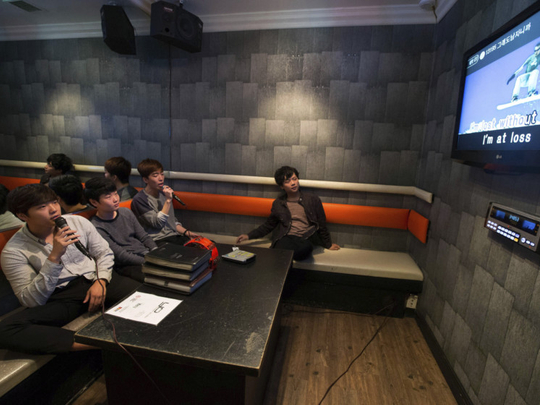
Across the world, fun comes in many shapes and sizes, but in South Korea, the best way to let your hair down is to book a dark room complete with disco lights, switch on the TV and sing to your heart’s content. Nearly got you there, didn’t we?
The official national pastime for Koreans is to head to a noraebang, or karaoke establishments, where they hire individual rooms with mikes and karaoke machines and sing along to famous Korean (K-pop is a big deal), Japanese, Chinese and even English tracks. Everyone goes, from kids to the elderly depending on the refreshments, which are brought to the rooms. As evenings meld into nights, all you need to bring to the table is the willingness to participate and letting go of inhibitions.
Noraebangs are so popular that in areas with significant Korean populations outside the country — such as in the US, UK, Australia and other parts of Asia like Japan — they are a mandatory presence.
Of course, Koreans and non-Koreans experience noraebangs differently but most people believe that it’s a momentous rite of passage into Korean culture and way of life. Talent is inconsequential, and the camaraderie that’s born out of these gatherings is often the foundation for lasting friendships.
“Most Koreans in their 20s and 30s drink, smoke and sing a lot,” says Junho Mark Byun, a 23-year-old soon-to-be product designer from New York. He was born in South Korea and moved to the US in 2003, but maintains close ties to his community.
“When Koreans go out, they go to noraebangs a lot. It’s a space for letting your emotions out. People go to have fun, celebrate or express sorrow. These outings could be planned, but they’re usually impulsive. I had friends in college who would go during their hour-long lunch break!”
For non-Koreans, noraebangs are a fascination, particularly when they visit for the first time. In his recent book Seoul Man: A Memoir of Cars, Culture, Crisis, and Unexpected Hilarity Inside a Korean Corporate Titan, former journalist Frank Ahrens describes his first evening in a noraebang, invited by his new colleagues at Hyundai, and his instinctive reaction is: “I’d expected South Korea to be more sterile. I’d had this feeling that South Korea existed 30 or so years in the future, where things are cleaner and more orderly... It turned out to be that — and something else: a gritty, bare-knuckled uppercut to the jaw.”
Nichola Gwon, a 33-year-old Australian webtoon artist who lives in South Korea with her husband, agrees. “The western aversion to having to sing can be a bit strange to Koreans because they see it as such a fun thing,” she says.
“I think people appreciate having this way of emotional release, especially when society can be rigid with a set hierarchy.”
For a lot of foreigners in South Korea, getting invited to a noraebang is the first step towards being accepted into its society, as Alba Ortiz, 26, discovered when she was a student at Sungkyunkwan University in Seoul eight years ago. “I had a romanticised notion of South Korea because of my love of Korean dramas and K-pop,” she says.
“However, I was always told that Koreans would discriminate against me, and it did happen sometimes, but soon they would notice I was just like them, studying and working hard, and they would invite me to go to after work gatherings and dinners. It meant that I was considered a part of the group, so for me it was as much a cultural experience as it was a regular outing.
“In many ways attending a noraebang with coworkers is a rite of passage. I was always the youngest, also known as maknae, so I was always in charge of serving my sunbae or senior his drinks. Noraebangs also showed me the difference in the way people act when they’re in school or at work versus when they’re outside having fun. The honorifics and hierarchical dynamics remain to some degree, but people do release the tension of having to be proper all the time.”
Asian non-Koreans have a mildly different perspective. Michael Yip, a 23-year-old Chinese-Canadian, loves the peppy K-pop that defines noraebangs. “At Chinese karaokes, for example, people mostly sing love ballads or romantic songs; Canto-pop is very sad!” he says. “You’d find people going in after break-ups really often.
“Noraebangs, though, are a place of celebration. K-pop is very upbeat and dancy.”
In South Korea, walking into a noraebang is as common as popping into a coffee shop. Game arcades, which are also extremely popular, often have tiny noraebangs big enough for two people to sit and sing. “These aren’t much bigger than a phone booth and you just pay a small amount and sing a few songs,” says Gwon. “My husband and I did that last week as we were walking home from dinner — just went into a booth for 20 minutes to sing some songs.”
The Gwons believe that the privacy of noraebangs is important, so people can relax or scream and shout and it doesn’t matter. South Korea is densely populated so people live in small houses very close to others, so at noraebangs, they can let off steam without bothering the neighbours. It’s therapeutic.








